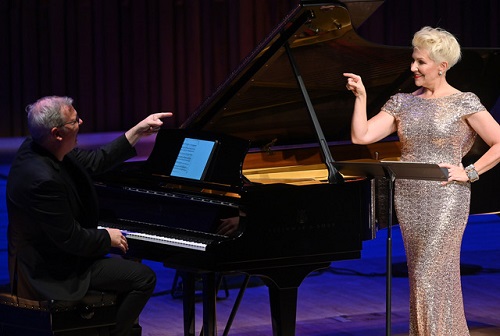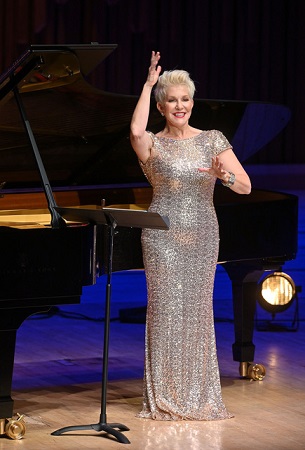Joyce DiDonato spoke very personally – but very universally – about what this recital meant, her first in London since the pandemic began. Music was about healing, but it was also about sorrow and mourning as the first half of this recital was apt to point out. Audiences, she said, were daring but a thing of beauty in this new age as we cast off the era of streaming where what we heard had been through headphones. This recital restored that balance all artists want: the one between intimacy and communion.
Listening to her reflect on the concept of time, I had thought of T S Eliot and the opening lines of ‘Burnt Norton’, the first poem of his Four Quartets. That comfort of understanding and playing with time wasn’t just in the music we heard – a constant theme in Eliot’s Four Quartets – wasn’t just about unravelling what we have learned from the pandemic and how we can emerge better from it. It was there on the stage as mezzo and pianist took us back to a time – and clearly forward into a new one, a kind of rebirth – when we could embrace each other rather than feel compelled that distance should often defeat this kind of search for reunion. It was a relief to see that Joyce DiDonato and Craig Terry felt entirely comfortable together and the music very much benefited from this kinetic freedom to be close.
This recital was very much in two parts. Haydn and Mahler in the first half, themed on grief, tragedy, finality and desolation, death and finally affirmation stood in stark contrast to the second half which, by the end, had taken us to Duke Ellington and Irving Berlin. But this was a program that seemed entirely right in the context of where we had been for the past eighteen months and where we were emerging from.
Although we began in the eighteenth century the subject matter went centuries further back. Haydn’s great Arianna a Naxos centres on Ariadne’s desertion by Theseus on the island of Naxos. Haydn takes the more tragic view where she isn’t rescued by Bacchus but dies frenzied, and distraught, her mind fragmented by torment. The opening recitative – taken slowly, though nor ponderously, here – promised much. The long piano opening was played evocatively, and beautifully, by Craig Terry and you felt the expressive and vivid phrasing, with its long lines, would be matched by DiDonato. And this proved to be the case. There is something rather imposing about this mezzo. The size of the voice is, of course, one part of this but there is also an inherent ability to tame it by the vibrant colouring. Those sensuous dark colours reach low down the scale and the voice trails effortlessly to the bottom of the register with the most sumptuous warmth of tone. When you listened to her, you sometimes wished Haydn had scored this piece for orchestra because her voice is so blushed with tints, it’s a choreography of mosaic-like colours a piano can never quite match. It was a feature of much of this concert, especially in the first half, that DiDonato’s tonal elegance often seemed a mismatch for some of the more monochromatic piano playing.
In the first Aria DiDonato carefully followed the unstable harmony in the piano writing – so what we got was a vision of Ariadne as fervent and emotional, tightly sung with a thrilling dramatic edge. The second Recitative, ‘Ma, a chi parlo?’, seems centuries later to have inspired Richard Strauss’s Alpensinfonie, but here it is the piano that provides us with the musical picture for Ariadne ascending the cliff top. This was something which Terry navigated with some skill on the keyboard. But this is also the movement that capitalises on the mezzo’s need to characterise Ariadne’s despair and exhaustion. DiDonato handled it impressively, so much so that when her inevitable grief became final it was all the more shattering.
If the Haydn had been at times emotionally overwhelming, Mahler’s Rückert-Lieder proved to be doubly uncomfortable. These are very lyrical and personal Mahlerian songs – but I think some of this was lost in translation. Played and sung on the slow side, these songs need to be taken outside their pencil-drawing scoring into a more detailed scale, and in the case of the two longest songs of a quite profound sensitivity. If Joyce DiDonato attempted this, Craig Terry floundered somewhat with playing that I found too two-dimensional, a little too neutral in music which is the opposite. In some places, notably the songs that need to reach the emotional core, Terry would sometimes be unwilling to make the notes stand out boldly enough, often making them sound more like a feinter version of the carbon paper beneath them. ‘Um Mitternacht’ proved challenging. This song’s metre didn’t quite feel as fluid as it might, although that didn’t always work against it because its pace elsewhere was heartfelt and both DiDonato and Terry understood the ontology of the lyrics. ‘Ich atmet’ einen linden Duft’ had been almost everything it should have been – exquisitely phrased, a paradigm of peerless tone – and yet it felt as if it was dawdling towards its conclusion. ‘Liebst du um Schönheit’ was rapturous, DiDonato’s breath control magnificent even if the piano rarely followed in her footsteps. It felt like an imperfect end to an otherwise superb first half of this recital.

Joyce DiDonato returned for the second half in a glittering silver gown and a very much brighter lit stage. This was a half which was heavy on virtuosity, which took us from Hasse’s Cleopatra and Berlioz’s Trojans through to the cabaret of the 1920s via vocal trills and pianistic glissandi. But, it was also a half in which the star mezzo was often happy to stand a little in the shadows to allow her pianist to shine, which he did.
‘Morte col fiero aspetto’ from Johann Adolph Hasse’s Marc’Antonio e Cleopatra is a magnificent aria from an uneven work. This piece was notorious at the time (1725) for the reversal of the roles – though switching gender might hardly seem revolutionary in the wider context of the times. Despite the unquestionable sensuality that DiDonato can bring to some of the music she sings, there is also a neutrality to other aspects of it which is remarkably unforced. Some of that came across in the Hasse aria, which although tumultuous needs a singer to step outside of it. The coloratura was there but so was an unusually defiant power. Suicide can be sacrificial, but it need not be embraced and that was the point here. There is, in one sense, a certain androgyny to the mezzo voice – just as there is at the opposite end of the scale with the countertenor – and DiDonato flirts with this concept on stage like few mezzos are willing to do. Arias by Handel (from Guilio Cesare in Egitto) and Berlioz (Les Trojans) kept a foot firmly in the ancient world – and the epicene. But as with the Hasse, this was a case of DiDonato using music from the past to push through to something in the present.
This recital had been titled “In My Solitude”, which is taken from the Duke Ellington song of the same name. The rest of the program (including a few encores) took us firmly into the twentieth century, but not necessarily into a period which was without its own ruptures and struggles. If this recital had been about identification with – and a predominantly mutual one – the experience of suffering in society and how music can lift you from the turbulence of immediate seismic events, I felt it could also have the opposite effect. Pandemics can be ephemeral events, but they can also have no cure or no end. The consequences of some pandemics are that time past and time future are very much the same thing and while music may heal in one it can only comfort and give strength in another.

This is not to say that Joyce DiDonato and Craig Terry didn’t do something very special with Ellington because they most certainly did. There’s something uniquely wonderful about a mezzo voice singing this kind of music – the smokiness, a certain burnt around the edges duskiness that’s often missing in higher ranged voices – and the sudden switch in range – were very often miraculous. Songs like ‘In my Solitude’ fire up only in front of live audiences, they almost get their oxygen from them. Would this ever have worked in lockdown? I doubt it since it felt here to have been entirely about this performance drawing its tempestuousness and solemnity from its audience. And although this is a song about the bitterness of loneliness it needs to step outside the isolation of solitude to achieve that wonderful optimism it also has. That DiDonato was able to bring her audience into her world was the resolution she was looking for and which she got. But it is also a world that Craig Terry sits comfortably inside of and he convinced us entirely of that.
Perhaps this, too, is why Louiguy’s ‘La Vie en Rose’ worked so compellingly as well. So indelibly associated with Édif Piaf the song has been covered so many times perhaps the initial roots of the song have been lost. Written in 1945, but not performed live by Piaf until 1946, ‘La Vie en Rose’ is entirely about the expression of true love, but it became more talismanic for many at the time as reaching out after the horrors of the second world war. DiDonato has sung ‘La Vie en Rose’ many times before but in this recital, at this time, it suggested a similar post-apocalyptic meaning. Piaf’s voice remains unique; DiDonato has neither the gritty alto lament, nor the street-hardened upper range of Piaf, but a more nuanced, velvety version of this song worked just as well – especially when sung and accompanied as beautifully as this one had been. This was also the case with Irving Berlin’s ‘I Love a Piano’, a gift for a singer like Joyce DiDonato. There was a wonderful raunchiness, especially at the end. Octaves tumbled down with fabulous self-assurance – and they came not just from the mezzo, but from a thrilling, impeccably showman-like piano accompaniment from Craig Terry. It all felt so remarkably free (and happily redolent of speakeasys and Soho jazz clubs).
If this recital had been different it was because the dynamic had been different. This felt less about the audience and the artists being there just in a commercial bargain with each other. It felt more like a need to be with each other in a moment of connection. But it also felt quite private, which is entirely what the art of the recital is about. Amid the havoc, fractures and turmoil of the recent past DiDonato and Terry had found a way to escape from it. If just for a couple of hours.
Joyce DiDonato will be performing again at the Barbican in her next project EDEN on Tuesday 5th and Wednesday 6th April 2022.
Marc Bridle
Joyce DiDonato (mezzo-soprano), Craig Terry (piano)
Haydn – Arianna a Naxos, Mahler – Rückert-Lieder, Hasse – ‘Morte col fiero aspetto’(from Marc’Antonio e Cleopatra), Handel – ‘É Pur così in un giorno … Piangerò la sorte mia’ from (Giulio Cesare in Egitto), Berlioz – ‘Ah!, Ah!, Je vais mourir … Adieu fière cité’ from (Les Troyens), Giordani – Caro mio ben (arr. Craig Terry), Parisotti & Rosa – Se tu m’ami/Star Vicino, Duke Ellington – (In My) Solitude (arr Craig Terry), Louiguy – La Vie en Rose (arr. Craig Terry), Berlin – ‘I Love a Piano’, Mozart – ‘Voi che sapate’, Alen/Harburg – ‘Over the Rainbow’.
Barbican Hall, London; Tuesday 26th October 2021.